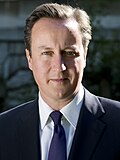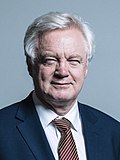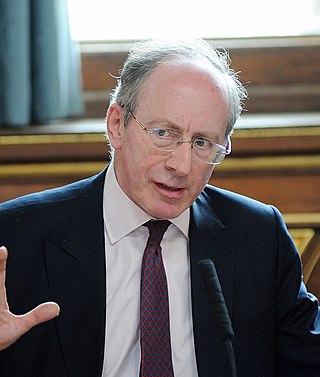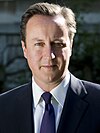
The Conservative Party, officially the Conservative and Unionist Party, sometimes informally called the Tories, is a centre-right political party in the United Kingdom. The governing party since 2010, it is the largest in the House of Commons, with 311 Members of Parliament, and also has 238 members of the House of Lords, 4 members of the European Parliament, 31 Members of the Scottish Parliament, 11 members of the Welsh Assembly, 8 members of the London Assembly and 7,462 local councillors.
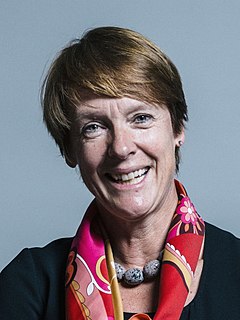
Dame Caroline Alice Spelman is a British Conservative Party politician who has served as the Member of Parliament (MP) for Meriden in the West Midlands since 1997. From May 2010 to September 2012 she was the Secretary of State for Environment, Food and Rural Affairs in David Cameron's coalition cabinet, and was sworn as a Privy Counsellor on 13 May 2010.
Patrick John Mercer is a British author and former politician. He was Conservative shadow homeland security spokesman before being forced to resign by David Cameron in 2007 for making "unacceptable" racist remarks in an interview with The Times. He was elected as a Conservative in the 2001 general election, until resigning the party's parliamentary whip in May 2013 following questions surrounding paid advocacy, and was an Independent MP representing the constituency of Newark in Parliament until his resignation at the end of April 2014 after the Standards Committee suspended him for six months for "sustained and pervasive breach of the house's rules".
David Laurie Ruffley is a Conservative Party politician in the United Kingdom. He was the Member of Parliament (MP) for the constituency of Bury St Edmunds in Suffolk, which encompasses Bury St Edmunds and Stowmarket, having first taken his seat at the 1997 general election.
Andrew Guy Tyrie, Baron Tyrie, PC is a British Conservative Party politician and chairman of the Competition and Markets Authority. He served as Member of Parliament (MP) for Chichester from 1997 to 2017.

Robert James MacGillivray Neill is a British barrister and Conservative Party politician. He has served as the member of parliament (MP) for Bromley and Chislehurst since a by-election on 29 June 2006, following the death of the previous incumbent Eric Forth. He served as a Parliamentary Under Secretary of State at the Department of Communities and Local Government from 14 May 2010 to 4 September 2012. He is the current Chair of Parliament's Justice Select Committee.
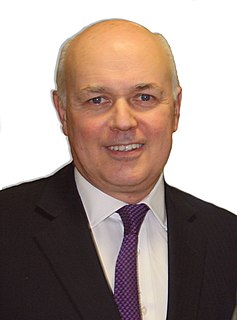
The 2001 Conservative Party leadership election was held after the British Conservative Party failed to make inroads into the Labour government's lead in the 2001 general election. Party leader William Hague resigned, and a leadership contest was called under new rules Hague had introduced. Five candidates stepped forward: Michael Ancram, David Davis, Kenneth Clarke, Iain Duncan Smith and Michael Portillo.

Robert John Blackman is a Conservative Party politician serving as Joint Executive Secretary of the 1922 Committee since 2012, and has served as Member of Parliament (MP) for Harrow East since 2010. He was also the Greater London Assembly member for Brent & Harrow between 2004 and 2008.

The 2010 United Kingdom general election was held on Thursday, 6 May 2010, with 45,597,461 registered voters entitled to vote to elect members to the House of Commons. The election took place in 650 constituencies across the United Kingdom under the first-past-the-post system. None of the parties achieved the 326 seats needed for an overall majority. The Conservative Party, led by David Cameron, won the largest number of votes and seats, but still fell 20 seats short. This resulted in a hung parliament where no party was able to command a majority in the House of Commons. This was only the second general election since the Second World War to return a hung parliament, the first being the February 1974 election. Unlike in 1974, the potential for a hung parliament had this time been widely considered and predicted, and both the country and politicians were better prepared for the constitutional process that would follow such a result. The coalition government that was subsequently formed was the first coalition in British history to eventuate directly from an election outcome. The hung parliament came about in spite of the Conservatives managing both a higher vote total and higher share of the vote than the previous Labour government had done in 2005, when it secured a comfortable majority.
In the parliamentary politics of the United Kingdom and Canada, one member, one vote (OMOV) is a method of selecting party leaders by a direct vote of the members of a political party. Traditionally, these objectives have been accomplished either by a party convention, a vote of members of parliament, or some form of electoral college. OMOV backers claim that OMOV enhances the practice of democracy, because ordinary citizens will be able to participate. Detractors counter that allowing those unversed in the issues to help make decisions makes for bad governance.
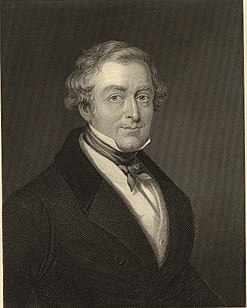
The Conservative Party is the oldest political party in the United Kingdom and arguably the world. The current party was first organised in the 1830s and the name "Conservative" was officially adopted, but the party is still often referred to as the Tory party. The Tories had been a coalition that more often than not formed the government from 1760 until the Reform Act 1832. Modernising reformers said the traditionalistic party of "Throne, Altar and Cottage" was obsolete, but in the face of an expanding electorate 1830s–1860s it held its strength among royalists, devout Anglicans and landlords and their tenants.

The 2003 Conservative Party leadership election was caused by the enforced resignation of incumbent leader Iain Duncan Smith after the loss of a confidence vote among his parliamentary party. The causes of Duncan Smith's fall are often cited as his lack of charisma and impact with the public, the uninspired direction of the party under his leadership, and his previous failure to achieve more than a third of support among Members of Parliament in the 2001 leadership contest. In the event, the Conservative Party coalesced around Michael Howard as replacement leader and there was not a contest to replace Duncan Smith.
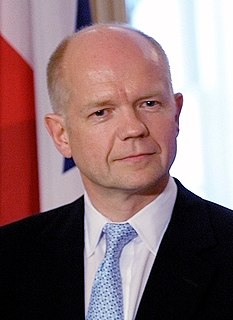
The 1997 Conservative Party leadership election was triggered in the British Conservative Party when John Major resigned on 2 May 1997, following his party's landslide defeat at the 1997 general election, which ended 18 years of Conservative Government of the United Kingdom. Major had been Conservative leader and Prime Minister since November 1990.

Andrew James Bridgen is a Conservative Party politician and businessman. Since May 2010 he has been the Member of Parliament (MP) for the constituency of North West Leicestershire. A prominent figure on the right of the party, he is a long-term critic of the European Union and supported Brexit in the 2016 United Kingdom European Union membership referendum. He is a vocal supporter of Eurosceptic pressure group Leave Means Leave. In addition, he was a prominent critic of Theresa May during her leadership of the Conservative Party.

The 2015 Labour Party leadership election was won by Jeremy Corbyn with a landslide victory. The election was triggered by the resignation of Ed Miliband as Leader of the Labour Party on 8 May 2015, following the party's defeat at the 2015 general election. Harriet Harman, the Deputy Leader, became Acting Leader but announced that she would stand down after the leadership election.

The 2016 Conservative Party leadership election occurred as a result of Prime Minister David Cameron's resignation as party leader. He had resigned following the national referendum to leave the European Union. Cameron, who supported Britain's continued membership of the EU, announced his resignation on 24 June, saying that he would step down by October. Theresa May won the contest on 11 July 2016, after the withdrawal of Andrea Leadsom left her as the sole candidate.

The 2019 Conservative Party leadership election was triggered when Theresa May announced on 24 May 2019 that she would resign as leader of the Conservative Party on 7 June, and as Prime Minister once a successor had been elected. Nominations were open on 10 June, and 10 candidates were nominated. The first ballot of MPs took place on 13 June, with exhaustive ballots of MPs also taking place on 18, 19 and 20 June, reducing the candidates to two. The general membership of the party elected the leader by postal ballot with the result announced on 23 July, with Boris Johnson being elected as leader with almost twice as many votes as his opponent Jeremy Hunt.





